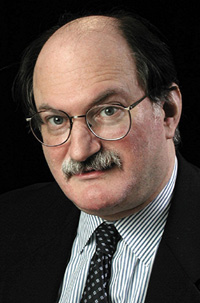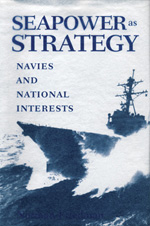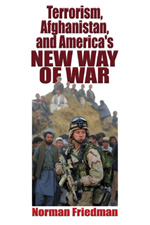|
|
|
BOOKSHELF
Norman Friedman ’67 fondly remembers
his Contemporary Civilization course, taken
his first year at the College. “It was the most valuable course
I took at Columbia. I wasn’t a political science major, but
things learned in CC carried me. It was what mattered.”
| 
|
| |
| Norman Friedman '67 |
 |
A physics major, Friedman took science and math courses for most
of his undergraduate years and eventually earned a physics Ph.D.
from Columbia in 1974. Working at an IBM lab, Friedman was on track
to becoming a physicist when a Dr. Garwin, a physicist at IBM, introduced
him to a career opportunity at the Hudson Institute, a major think
tank. For the next 11 years, Friedman concerned himself not with
lab work and experiments but with government policies and defense
strategies. Although the majority of his College education had not
geared him toward this line of work, Friedman succeeded and was
grateful that CC had encouraged him to develop an understanding
of politics and government.
Friedman did not abandon his science roots, however, as his physics
background made him keenly aware of the important impact of technology
on government policy. His technical analysis on topics ranging from
naval weapons to nuclear strategy has become the trademark of more
than 20 books.
With his job demanding frequent trips to Washington, D.C., Friedman
pursued his interest in naval history by conducting research at
the National Archives and collecting declassified documents. His
continued efforts have allowed him to publish books almost yearly
since 1978. As a noted naval historian, Friedman has seen his naval
design histories come to be regarded as standard reference works.
His most recent book in the naval design histories series, U.S.
Amphibious Ships and Craft ($85, Naval Institute Press), details
amphibious ships and craft since the 1920s, including the contributions
of the U.S. Army, Navy and Marines and the British military to their
development and the tactical uses of each ship and craft. The book
includes ship plans drawn by A.D. Baker, former editor of The
Naval Institute Guide to Combat Fleets of the World.
| 
|
| |
| Seapower as Strategy:
Navies and National Interests by Norman Friedman '67 |
 |
Friedman also has written on policies and strategies in the Cold
War and the Gulf War. His upcoming book, Terrorism, Afghanistan,
and America’s New Way of War ($29.95, Naval Institute
Press; due spring 2003) examines the changes in U.S. tactical and
strategic approaches after September 11. He points out that since
September 11, the United States has been trying to reverse the notion
that it is hesitant to act against those who commit terrorist acts
on Americans. He also argues that Osama bin Laden launched the terrorist
attack to inspire a worldwide Muslim movement that would result
in a pan-Muslim empire.
Friedman’s strong assertions on the motives and actions
of the terrorists and the United States are accompanied by technical
analysis of U.S. military tactics, including contributions by the
U.S. Navy and Marine Corps fighting in landlocked Afghanistan. In
light of global developments, Friedman hopes to write more on the
evolving policies and strategies of the United States in its campaign
against terrorism.
| 
|
| |
| Terrorism, Afghanistan,
and America's New Way of War by Norman Friedman '67 |
 |
A lifetime resident of New York, Friedman works as an independent
consultant for the Navy, Marine Corps, Coast Guard and various defense
contractors, and writes a monthly column for Proceedings magazine,
a Naval Institute publication, as well as other journals worldwide.
He has appeared regularly on television as a guest commentator,
and he lectures on defense issues at the National Defense University,
the Naval War College and the Royal United Services Institute. In
1984, Friedman’s reputation as a noted defense expert and
Navy historian helped him to become a consultant to the secretary
of the Navy, which he did for the next decade.
Friedman still feels the effect of Contemporary Civilization and
notes the importance of a good start in college: “Freshman
courses will carry you if they’re excellent. I still benefit
from the CC course because it gave me a better understanding of
politics, governments and the world.”
More of Friedman’s books can be found on the Naval
Institute Press website.
P.K.
Columbia College Today features
books by alumni and faculty as well as books about the College
and its people. For inclusion, please send review copies to:
Laura Butchy, Bookshelf Editor
Columbia College Today
475 Riverside Drive, Ste. 917
New York, NY 10115-0998 |
|
|
Untitled Document
|






